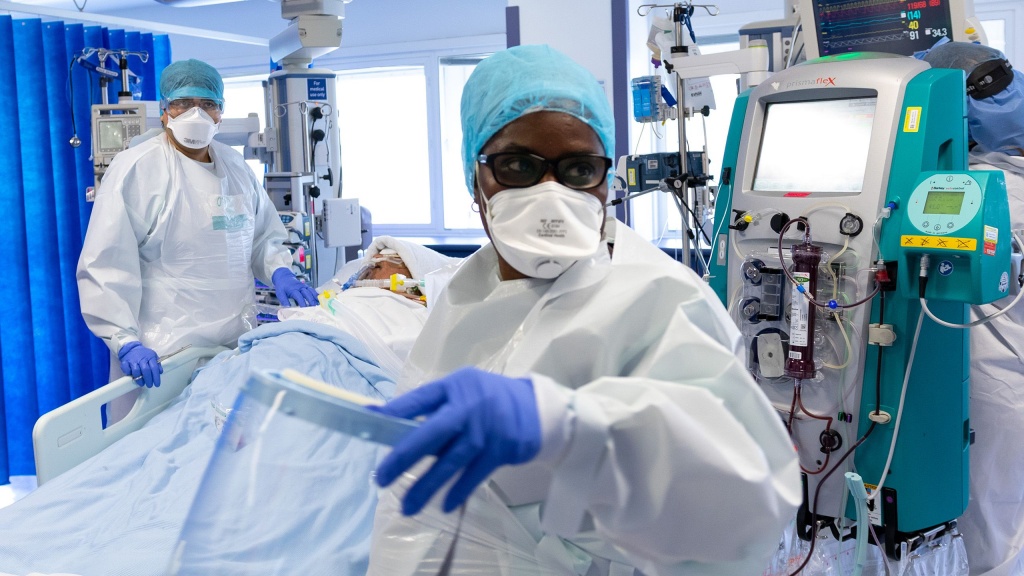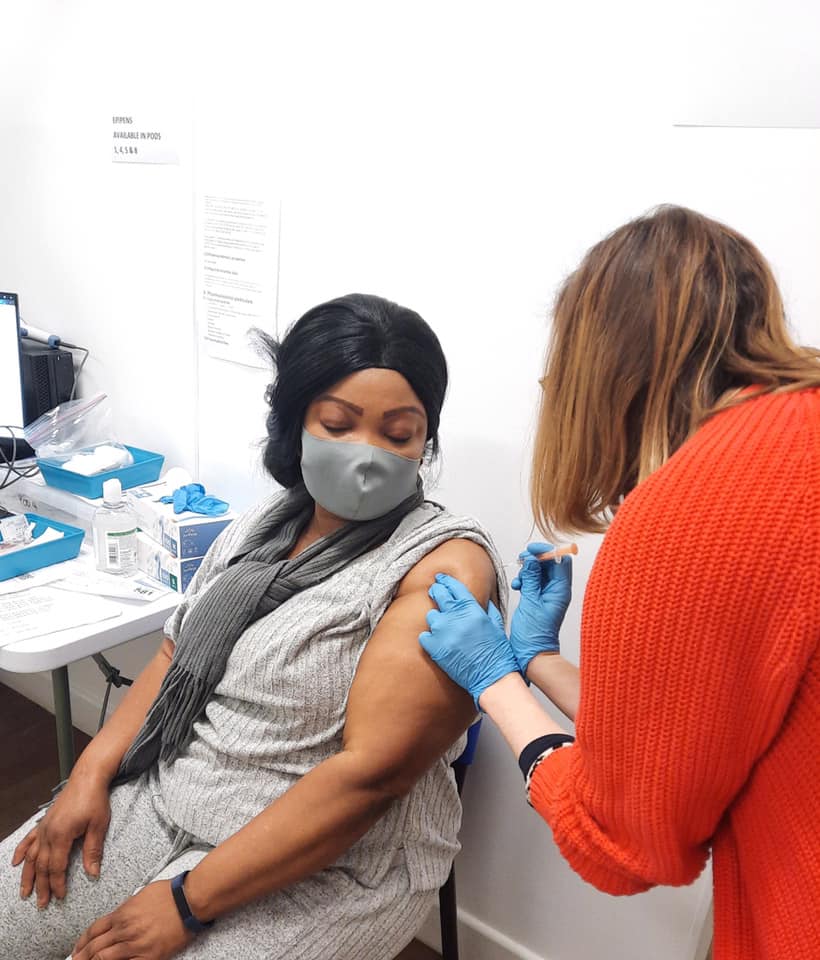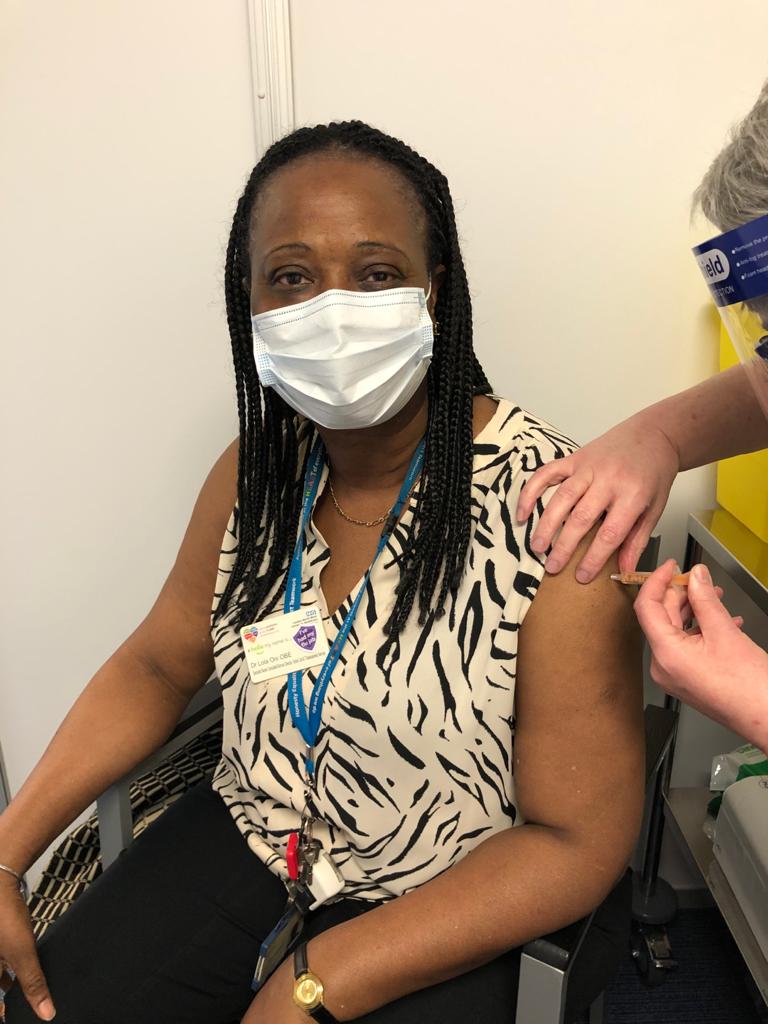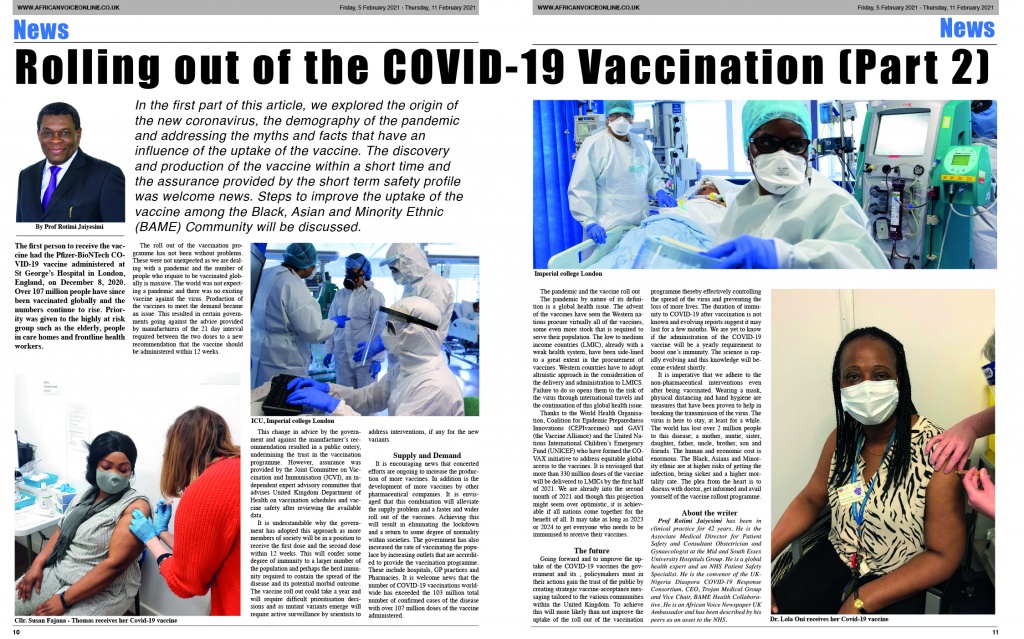
Professor Rotimi Jaiyesimi – In the first part of this article, we explored the origin of the new coronavirus, the demography of the pandemic and addressing the myths and facts that have an influence of the uptake of the vaccine. The discovery and production of the vaccine within a short time and the assurance provided by the short term safety profile was welcome news. Steps to improve the uptake of the vaccine among the Black, Asian and Minority Ethnic (BAME) Community will be discussed.
The first person to receive the vaccine had the Pfizer-BioNTech COVID-19 vaccine administered at St George’s Hospital in London, England, on December 8, 2020. Over 107 million people have since been vaccinated globally and the numbers continue to rise. Priority was given to the highly at risk group such as the elderly, people in care homes and frontline health workers.
The roll out of the vaccination programme has not been without problems. These were not unexpected as we are dealing with a pandemic and the number of people who require to be vaccinated globally is massive. The world was not expecting a pandemic and there was no existing vaccine against the virus. Production of the vaccines to meet the demand became an issue. This resulted in certain governments going against the advice provided by manufacturers of the 21day interval required between the two doses to a new recommendation that the vaccine should be administered within 12 weeks. This change in advice by the government and against the manufacturer’s recommendation resulted in a public outcry, undermining the trust in the vaccination programme. However, assurance was provided by the Joint Committee on Vaccination and Immunisation (JCVI), an independent expert advisory committee that advises United Kingdom Department of Health on vaccination schedules and vaccine safety after reviewing the available data.
It is understandable why the government has adopted this approach as more members of society will be in a position to receive the first dose and the second dose within 12 weeks. This will confer some degree of immunity to a larger number of the population and perhaps the herd immunity required to contain the spread of the disease and its potential morbid outcome. The vaccine roll out could take a year and will require difficult prioritisation decisions and as mutant variants emerge will require active surveillance by scientists to address interventions, if any for the new variants.

Supply and Demand
It is encouraging news that concerted efforts are ongoing to increase the production of more vaccines. In addition is the development of more vaccines by other pharmaceutical companies. It is envisaged that this combination will alleviate the supply problem and a faster and wider roll out of the vaccines. Achieving this will result in eliminating the lockdown and a return to some degree of normality within societies. The government has also increased the rate of vaccinating the populace by increasing outlets that are accredited to provide the vaccination programme. These include hospitals, GP practices and Pharmacies. It is welcome news that the number of COVID-19 vaccinations world-wide has exceeded the 103 million total number of confirmed cases of the disease with over 107 million doses of the vaccine administered.
The pandemic and the vaccine roll out
The pandemic by nature of its definition is a global health issue. The advent of the vaccines have seen the Western nations procure virtually all of the vaccines, some even more stock that is required to serve their population. The low to medium income countries (LMIC), already with a weak health system, have been side-lined to a great extent in the procurement of vaccines. Western countries have to adopt altruistic approach in the consideration of the delivery and administration to LMICS. Failure to do so opens them to the risk of the virus through international travels and the continuation of this global health issue.
Thanks to the World Health Organisation, Coalition for Epidemic Preparedness Innovations (CEPIvaccines) and GAVI (the Vaccine Alliance) and the United Nations International Children’s Emergency Fund (UNICEF) who have formed the COVAX initiative to address equitable global access to the vaccines. It is envisaged that more than 330 million doses of the vaccine will be delivered to LMICs by the first half of 2021. We are already into the second month of 2021 and though this projection might seem over optimistic, it is achievable if all nations come together for the benefit of all. It may take as long as 2023 or 2024 to get everyone who needs to be immunised to receive their vaccines.

The future
Going forward and to improve the uptake of the COVID-19 vaccines the government and its, policymakers must in their actions gain the trust of the public by creating strategic vaccine-acceptance messaging tailored to the various communities within the United Kingdom. To achieve this will more likely than not improve the uptake of the roll out of the vaccination programme thereby effectively controlling the spread of the virus and preventing the loss of more lives. The duration of immunity to COVID-19 after vaccination is not known and evolving reports suggest it may last for a few months. We are yet to know if the administration of the COVID-19 vaccine will be a yearly requirement to boost one’s immunity. The science is rapidly evolving and this knowledge will become evident shortly.
It is imperative that we adhere to the non-pharmaceutical interventions even after being vaccinated. Wearing a mask, physical distancing and hand hygiene are measures that have been proven to help in breaking the transmission of the virus. The virus is here to stay, at least for a while. The world has lost over 2 million people to this disease; a mother, auntie, sister, daughter, father, uncle, brother, son and friends. The human and economic cost is enormous. The Black, Asians and Minority ethnic are at higher risks of getting the infection, being sicker and a higher mortality rate. The plea from the heart is to discuss with doctor, get informed and avail yourself of the vaccine rollout programme.
About the writer
Prof Rotimi Jaiyesimi has been in clinical practice for 42 years. He is the Associate Medical Director for Patient Safety and Consultant Obstetrician and Gynaecologist at the Mid and South Essex University Hospitals Group. He is a global health expert and an NHS Patient Safety Specialist. He is the convenor of the UK-Nigeria Diaspora COVID-19 Response Consortium, CEO, Trojan Medical Group and Vice Chair, BAME Health Collaborative. He is an African Voice Newspaper UK Ambassador and has been described by his peers as an asset to the NHS.
Kindly follow us on twitter:@AfricanVoice2












